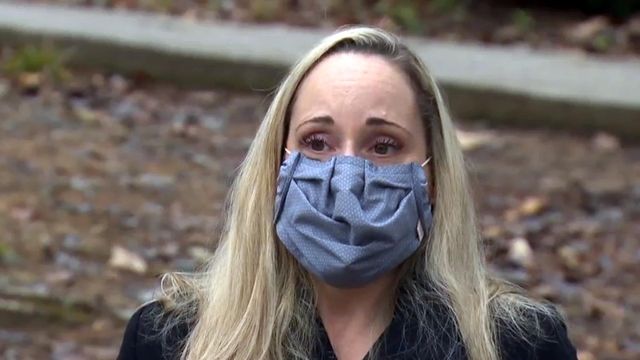Many NC counties require deputies to take people to mental health facilities
After her 14-year-old daughter tried to overdose on pills, Chrysti Peek sought help. But when that help came, the teen was placed in handcuffs and put in the back of a police car.
Posted — UpdatedNow, the Durham mother is pushing for change, spotlighting a state law and a county policy that have gone largely under the radar.
Peek said that she wants nothing more than to protect her daughter, but she fears she failed.
"I am afraid that, if she was ever in this position again, she wouldn’t want to tell us," she said, choking back tears.
Her daughter came to her in the middle of the night a couple of days after Christmas to tell her she had tried to harm herself and needed help.
"She understood what should come next. I don’t think any of us understood what would actually come next," Peek said.
Her parents rushed her to the emergency room at Duke University Hospital, where she was quickly cleared medically. The family wanted her to get treatment at a mental health facility, but they didn't realize that would be considered an “involuntary commitment,” requiring that she be taken for treatment in handcuffs in the back of a deputy’s car.
There was an available bed, but because no deputy was immediately available, Peek said her daughter waited two days in the hospital, delaying needed care.
"Everything about this experience sounds like a punishment," she said.
State law requires counties to determine how they transport people for involuntarily psychiatric commitments. In September 2019, Durham County commissioners approved a policy to use law enforcement.
Acknowledging that he doesn’t know the specifics of the Peek family's case, he said it's surprising the teen was considered an involuntary commitment rather than a voluntary admission and that the parents weren't allowed to take their daughter to the mental health facility themselves.
"It sounds like they could have. It sounds like one might say they should have," he said.
County policy states that, even under involuntary commitments, “a clerk, a magistrate, or a district court judge” can authorize the family to do the transport.
The North Carolina Sheriffs’ Association recently recommended that involuntary commitment orders be carried out by mental health professionals instead of deputies.
"With everything going on across the country, we know that law enforcement is not always the best option or should not be the first choice," Durham County Sheriff Clarence Birkhead said. "There are going to be times that we have to do them for safety reasons, but yeah, I would welcome an alternative."
But Brenda Howerton, chairwoman of the Durham County Board of Commissioners, said there are no plans to change the policy on involuntary commitments.
Related Topics
• Credits
Copyright 2024 by Capitol Broadcasting Company. All rights reserved. This material may not be published, broadcast, rewritten or redistributed.






